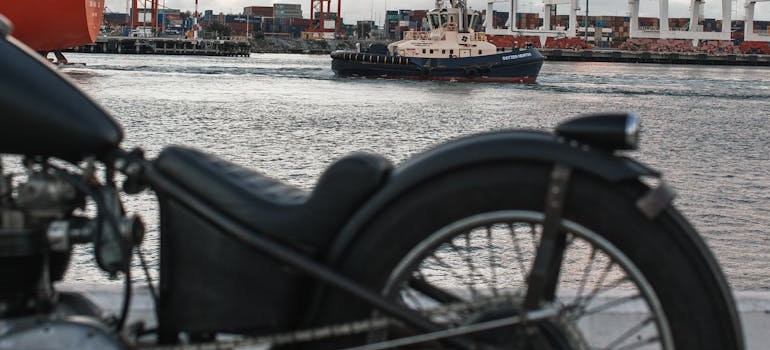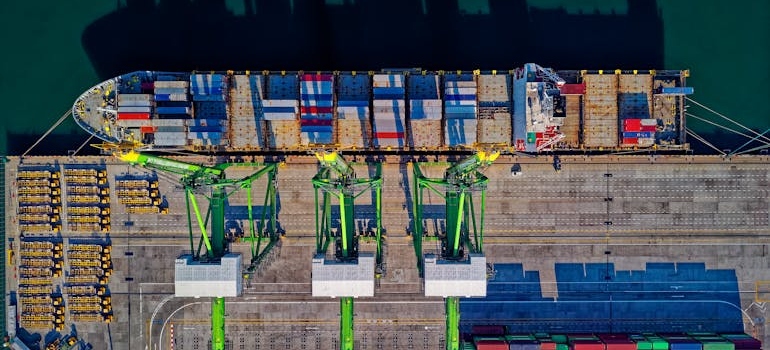Efficient Strategies for Shipping a Motorcycle Across Country
For many, motorcycling is a passion that goes beyond a mode of transportation. But sometimes, riding your motorcycle from one location to another isn’t feasible or practical. For example, when you’re relocating, selling, buying, attending a distant rally or race, or even going on a vacation, the need arises for shipping a motorcycle across country or overseas. Motorcycle shipping services cater to these exact needs. As you’re about to see from our Hansen Bros. Moving & Storage guide, these services eliminate the hassle and risks associated with long-distance riding, such as fatigue, weather constraints, and potential wear and tear on the bike. Hence, vehicle shipping services ensure that your prized motorcycle reaches the desired destination in the same condition as it was dispatched, without adding unnecessary mileage.
Essentials of Motorcycle Transport
When it comes to shipping a motorcycle across the US, understanding the available transport options and the necessary preparations for your bike are fundamental. These elements will influence your motorcycle’s safety and condition upon arrival and affect your peace of mind throughout the process.
Open vs. Enclosed Transport: What’s Best for Your Bike?
Selecting between open and enclosed transport significantly impacts your motorcycle’s shipping experience. Open transport means your bike is loaded onto an open trailer and exposed to the elements. This option suits those prioritizing budget-friendly options, as it’s usually less expensive. However, it lacks protection from weather, road debris, and potential prying eyes.
Enclosed transport, on the other hand, offers a shielded environment, safeguarding bikes from external conditions. It’s a preferred choice for high-value or antique motorcycles, albeit at a higher cost.

Pre-Shipment Preparation for Motorcycle Safety
Preparing your motorcycle for shipment is equally important. You should always start by cleaning your bike. A clean motorcycle reveals any existing damages more clearly, which is essential for pre-shipment inspection. Document the bike’s condition with photos from various angles to provide a record for comparison upon delivery. Next, reduce the risk of leaks by draining most of the fuel from the tank, ideally leaving it only a quarter full.
Secure loose parts and accessories and remove anything that can detach during transit, like saddlebags or aftermarket additions. Check tire pressure, as correctly inflated tires aid in stabilizing the bike during transportation. Finally, ensure the motorcycle is in neutral gear and the alarm system, if any, is deactivated.
Factors Influencing the Cost of Shipping a Motorcycle
When considering the cost of shipping a motorcycle, either locally or cross-country, it’s essential to understand the variables that impact pricing. This knowledge is key to estimating how much shipping a motorcycle will cost and planning your budget accordingly.
Distance and Route: How They Affect Pricing
The distance and route significantly influence the cost of shipping a motorcycle cross-country. Long-haul shipments naturally incur higher costs due to greater fuel consumption, driver hours, and wear and tear on transport vehicles. Routes that traverse through challenging terrain or congested urban areas can also increase costs due to slower travel times and the need for specialized navigation. Urban areas might attract higher fees due to traffic management and logistical challenges, whereas remote or less accessible locations may incur additional charges for the extra effort needed to deliver.
Motorcycle Specifications: Weight and Size Considerations
The bike’s weight and dimensions are critical factors when assessing how much shipping a motorcycle costs. Standard motorcycles usually fit into the regular pricing brackets, but larger models like touring bikes or choppers often exceed these limits, resulting in higher charges. The shipping cost can escalate if your motorcycle requires more space than usual or special handling by heavy equipment movers due to its unique build or modifications.

Seasonal Variations: Timing Your Shipment for Optimal Rates
Like any transportation service expense, the shipping a motorcycle cost can vary with seasonal demand fluctuations. Peak seasons, such as summer months and early fall, are popular for motorcycle events and road trips, leading to higher demand for shipping services and subsequently increased prices. In contrast, shipping during the off-peak seasons, like late fall and winter, can be more cost-effective, as reduced demand may lead to lower rates.
Insurance and Additional Services: Balancing Cost and Safety
Finally, insurance and additional services also affect the cost of shipping a motorcycle. While opting for basic insurance might be more cost-effective, it may not provide adequate coverage for high-value or vintage bikes. Although more expensive, comprehensive insurance offers greater protection and peace of mind.
Additional services, such as expedited shipping, door-to-door delivery, or special handling, enhance convenience and safety but will add to the overall cost. Balancing these added costs with the level of service and protection you require is essential in determining the total transportation expense.
Domestic Motorcycle Shipping: USA and Hawaii
Navigating the logistics of domestic motorcycle shipping, whether it’s within the continental United States or Hawaii, involves understanding the nuances of each process. From selecting a reputable carrier to understanding the specific requirements for different destinations, here’s what you need to know.
Overview of Shipping Within the Continental US
Shipping a motorcycle cross country offers several options, ranging from open trailers to specialized motorcycle transport services. The choice depends on your budget, the level of protection desired, and the distance. Local transporters might offer cost-effective solutions for shorter distances, whereas long-distance shipping often necessitates more robust logistics, potentially involving multiple transport modes. The key is to find a balance between cost, transit time, and your motorcycle’s safety.

Shipping to Hawaii: Special Requirements and Costs
Shipping a motorcycle to Hawaii involves additional layers of complexity due to the geographical separation. Unlike continental shipping, transporting to Hawaii requires over-water travel, typically via cargo ship. This process includes specific packaging and crating requirements to ensure the bike’s safety during the sea journey. The costs are generally higher than standard cross-country shipping due to the additional handling and the ocean freight charges.
Selecting a Trustworthy Domestic Carrier
Choosing a reliable carrier is paramount. Research potential shipping companies, focusing on their experience, customer reviews, and service offerings. Look for shipping companies Seattle offers that specialize in motorcycle shipping, as they will have the necessary equipment and expertise. Verify their licensing and insurance coverage, and don’t hesitate to ask for references or case studies of previous shipments.
For an efficient cross-country motorcycle shipping experience, consider the following tips:
- Plan in advance: Booking early can secure better rates and ensure availability, especially during peak seasons.
- Prepare your motorcycle: Follow the guidelines for pre-shipment preparations, such as draining fluids and securing loose parts.
- Stay informed: Ensure clear communication with the carrier throughout the process. Opt for services that offer tracking for real-time updates on your shipment’s status.
- Inspect upon arrival: Upon delivery, thoroughly inspect your motorcycle for any damages incurred during transit, comparing it against the pre-shipping condition.
Take the time to explore these various aspects so you can confidently manage the domestic shipping process. This will ensure your motorcycle reaches its destination safely and efficiently, whether it’s across the continent or over the Pacific to Hawaii.
Shipping a Motorcycle Overseas
Among other overseas destinations, shipping a motorcycle to Europe involves managing a complex array of customs regulations, tax implications, and specific international shipping procedures. Here’s a detailed look at what you need to know for a smooth overseas motorcycle shipping experience.
Europe-Bound: Navigating Customs, Taxes, and Costs
When shipping a motorcycle to Europe, understanding the customs and tax requirements of the destination country is crucial. Each European country has its own set of rules regarding vehicle importation, which can include paying import duties and taxes. The cost of shipping can vary widely based on the destination, shipping method (air or sea freight), and the size and weight of the motorcycle.

International Shipping Procedures and Expectations
Overseas motorcycle shipping typically involves more steps than domestic shipping. This includes choosing one of the best international commercial shipping companies, understanding shipping options (container shipping vs. roll-on/roll-off), and preparing necessary documentation, like the bill of lading, export declaration, and proof of ownership.
Depending on the method and distance, shipping a motorcycle across country can range from a few weeks to a couple of months. It’s also important to consider how your motorcycle is packed, as it needs to be secured properly in a crate or pallet for the journey.
Key Considerations for Overseas Transport
You should consider several key factors for successful overseas motorcycle transport:
- Insurance: Opt for comprehensive international shipping insurance to protect against potential damage or loss during transit.
- Regulatory Compliance: Ensure that your motorcycle complies with the environmental and mechanical regulations of the destination country.
- Costs: Be prepared for additional costs such as port handling fees, customs duties, and storage charges.
- Professional Assistance: Working with a reputable shipping company experienced in international motorcycle transport can help navigate the complexities of customs and shipping regulations.
- Tracking and Communication: Choose a service that provides tracking and regular updates to keep you informed about the shipment’s progress.
Pay close attention to these details so you can facilitate a more seamless and stress-free overseas shipping experience for your motorcycle—whether it’s for a relocation, sale, or an international adventure.
Most Cost-Effective Motorcycle Shipping Strategies
When it comes to shipping your motorcycle, savvy planning and strategic decisions can make a significant difference in your expenses. Here’s how you can navigate the process to ensure you’re getting the most value for your money.
Multiple Quotes and Service Comparisons
Start by gathering quotes from multiple shipping companies. Don’t just look at the bottom line; consider what’s included in each quote. Are they offering door-to-door service, or is it terminal-to-terminal? What kind of insurance is included? Compare these details side by side to understand what you’re really getting for your money. Remember, the cheapest option might not always offer the best value, especially when it comes to your motorcycle’s safety.
Strategic Timing for Economical Shipping
Timing can significantly impact the cost of shipping your motorcycle. Avoid peak seasons like summer and early fall, when demand is high and prices typically increase. If your schedule allows, opt for shipping during the off-peak months. This can result in lower costs, and freight companies in Seattle might also have more flexible schedules, potentially speeding up your delivery.

Insurance Selection: Balancing Costs and Coverage
Insurance is an area where you want to be particularly mindful. While it’s tempting to go for the cheapest insurance option, consider the value of your motorcycle and what you’re comfortable risking. Often, spending a bit more for comprehensive coverage is worth the peace of mind, especially for high-value or long-distance shipments. Weigh the cost of the premium against the potential risk to make an informed decision.
Evaluating DIY Shipping Against Professional Services
Finally, consider the pros and cons of DIY shipping versus using professional services. Renting a trailer and doing it yourself might seem more economical, but factor in the costs of rental, fuel, time, and potential risks of damage or accidents. Professional shippers have the right equipment and experience to handle your bike properly, often making it a more secure and stress-free choice in the long run.
Gear Up for Smart Shipping
Understanding the nuances of different shipping options, preparing your motorcycle for shipping, and choosing the right time and insurance are keys to a smooth motorcycle shipping process. It’s not just about getting your motorcycle from point A to point B but doing so in a way that balances cost, safety, and convenience. Your role in this process is crucial – you’re not just a bystander but an active participant ensuring the safe and economical transit of your bike.
Armed with the insights and strategies for shipping a motorcycle across country, you’re now equipped to make informed choices. You can also adapt them and ensure they fit your specific needs, paving the way for a successful shipping experience. So, when it’s time to ship your motorcycle, you’re ready to handle it like a seasoned pro.
Why Choose Us
History
Hansen Bros. Moving & Storage is locally owned and operated by the same family for four generations, since 1890. We have a well-established reputation for service quality and reliability with a high percentage of repeat household and commercial clients.
Professionalism
We’re a certified ProMover by the American Moving and Storage Association with A+ rating with the Better Business Bureau, voted “Best in Western Washington” in 2009 and from 2011 to 2016 by KING5. Our company is fully licensed and insured and member of WMC and AMSA.
Value
Hansen Bros. Moving & Storage provide free, no-obligation in-home estimate and competitive rates, including low minimum rates for shipments moving under 300 miles. We’ve set a refund policy for unused packing materials and three Puget Sound locations to help clients save on travel fee costs.



